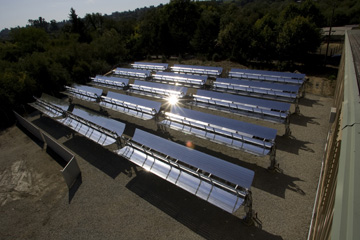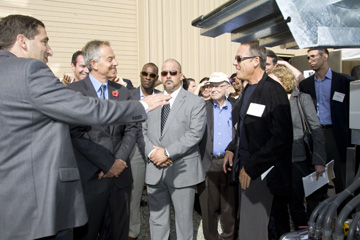Tony Blair Visits Sonoma Winery for Solar Unveiling

GRATON, Calif. – A Sonoma County winery is one of the latest California winegrowers to begin generating a portion of its electricity from sun power. The Sonoma Wine Co. dedicated 15 cogeneration systems provided by photovoltaic design/build firm Cogenra Solar during recent ceremony that included, amongst its attendees, former British Prime Minister Tony Blair and several regional winegrowers.
Natasha Granoff, the director of business development for the Sonoma Wine Co., says her winery considered conventional photovoltaic installations before investigating a new technology from Congenra Solar that provided both electricity, for lighting, cooling, and bottling operations, and hot water, for wine barrel cleansing.
The Cogenra SunBase ground-mounted modules, each about 39 feet in length with a footprint of 900 square feet, feature a parabola of mirrors that optimize the amount of sunlight shining on a narrow strip of solar panels at the center of every parabola. Each module pivots on its base to follow the direction of the sun and features a heat exchanger that captures heat energy in a glycol mixture. The glycol is piped to a boiler, where it heats water to about 165 F, and then returned to the photovoltaic system, once the heat is dissipated, to cool the solar cells.
"If Cogenra’s estimates are correct and we are consistent with our demand, the installation should reduce our natural gas use by about 50 percent and our electrical needs 10-15 percent," says Granoff. "On an annual basis, that equates to about 62,000 kilowatts of electricity and roughly 12,500 therms of natural gas. So it’s less on the electrical side, but where we spend most of our money on energy is on the natural gas side anyway."

The Sonoma Wine Co. signed a 15-year heat and power purchase agreement with Cogenra. The winery spent no capital funds on the solar panels and instead purchases generated electricity directly from Cogenra, which owns and maintains the 272-kilowatt installation.
Venture tech firm Khosla Ventures, of which Tony Blair is an advisor to, invested $10.5 million into the one-year-old Cogenra Solar. Blair, a longtime proponent of green energy, attended the Nov. 4 dedication to show his support for the renewable energy sector.
"Technological innovation is the key to mitigating climate change; though clean technologies must make economic sense," Blair has stated. "Because Cogenra has achieved a cost-effective approach, the environmental benefits of solar cogeneration have the potential for true global impact."
The Sonoma Wine Co. was the first commercial-scale application of Cogenra’s SunBase technology. The SunBase modules are reportedly five times more efficient than traditional photovoltaics because of the application of mirrors. Plus, they are designed and constructed from pre-existing solar equipment rather than from new pieces.
"The typical solar photovoltaic panel is made of silicon, which absorbs the sun’s radiation and converts only a fraction of that energy into electricity," explains Dr. Gilad Almogy, CEO of Cogenra. "People have been trying for many years now to make these solar cells better, but the fact is silicon-based cells have something like 15 percent efficiency, meaning most of the radiation is lost, largely in the form of heat.
"For a typical panel, if you want more power you have to put out a larger area of silicon, and silicon can be very expensive," says Almogy. "What we do is we intercept the sun not with silicon but with flat mirrors. The mirrors reflect the sunlight onto the silicon, which in our case is a much smaller amount of silicon than typical panels have. As a result, the heat created is much more dense and it becomes more practical to pull that heat out."

The ability to heat water makes the technology ideal for winegrowers and other food manufacturers like breweries, meat packers, and cheese makers, says Almogy. Other applications the CEO can envision are in places with large concentrations of people living together, like resorts, college campuses, army bases, and correctional facilities.
"There are other applicable industries, but we are focusing very heavily on food," Almogy says. "We are in varied discussions with businesses across the wine industry and across other food industries. From here, we plan on proliferating the wine industries in Napa and Sonoma, then wineries across the rest of California and onto other food sectors."
According to the California Sustainable Wine Growing Alliance, a nonprofit charged with implementing sustainable wine growing measures, there are 94 wineries that belong to the alliance and have solar installations.
"Solar has definitely been a growing trend in the industry," says Allison Jordan, Executive Director of the Alliance. "I think there are roughly 100 winery solar projects that are in the pipeline or already on the ground all around the state.
"It’s an industry that lends itself well to solar because of the need for relatively sunny locations, large buildings, and plenty of open spaces where solar makes sense, whether it’s on top of a barrel room, over parking areas, or in some other creative place," she adds. "The climate is probably the main reason why it works so well though."
